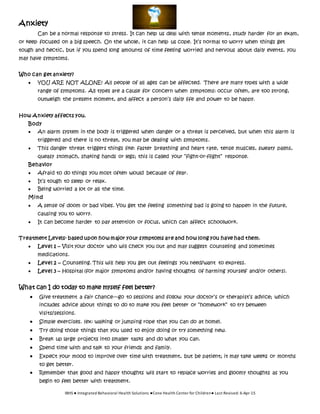
Anxiety
- 1. IBHS ● Integrated Behavioral Health Solutions ●Cone Health Center for Children● Last Revised: 6-Apr-15 Anxiety Can be a normal response to stress. It can help us deal with tense moments, study harder for an exam, or keep focused on a big speech. On the whole, it can help us cope. It’s normal to worry when things get tough and hectic, but if you spend long amounts of time feeling worried and nervous about daily events, you may have symptoms. Who can get anxiety? YOU ARE NOT ALONE! All people of all ages can be affected. There are many types with a wide range of symptoms. All types are a cause for concern when symptoms: occur often, are too strong, outweigh the present moment, and affect a person’s daily life and power to be happy. How Anxiety affects you. Body An alarm system in the body is triggered when danger or a threat is perceived, but when this alarm is triggered and there is no threat, you may be dealing with symptoms. This danger threat triggers things like: faster breathing and heart rate, tense muscles, sweaty palms, queasy stomach, shaking hands or legs; this is called your “fight-or-flight” response. Behavior Afraid to do things you most often would because of fear. It’s tough to sleep or relax. Being worried a lot or all the time. Mind A sense of doom or bad vibes. You get the feeling something bad is going to happen in the future, causing you to worry. It can become harder to pay attention or focus, which can affect schoolwork. Treatment Levels- based upon how major your symptoms are and how long you have had them. Level 1 – Visit your doctor who will check you out and may suggest counseling and sometimes medications. Level 2 – Counseling. This will help you get out feelings you need/want to express. Level 3 – Hospital (for major symptoms and/or having thoughts of harming yourself and/or others). What can I do today to make myself feel better? Give treatment a fair chance—go to sessions and follow your doctor’s or therapist’s advice; which includes advice about things to do to make you feel better or “homework” to try between visits/sessions. Simple exercises. (ex: walking or jumping rope that you can do at home). Try doing those things that you used to enjoy doing or try something new. Break up large projects into smaller tasks and do what you can. Spend time with and talk to your friends and family. Expect your mood to improve over time with treatment, but be patient; it may take weeks or months to get better. Remember that good and happy thoughts will start to replace worries and gloomy thoughts as you begin to feel better with treatment.
- 2. IBHS ● Integrated Behavioral Health Solutions ●Cone Health Center for Children● Last Revised: 6-Apr-15 3- Step Game Plan Become a relaxation expert– learning relaxation skills (e.g. deep breathing, yoga, etc.). These will help relax your muscles, breathing, and heart rate; and will help your entire body to loosen up. Think of things you are thankful for– think of one thing that makes you smile or makes you feel good. This could be your favorite person, joke, or place. Close your eyes and picture it. What can you hear? What can you see? Try to connect with nature, it will help you feel peaceful and grounded. ”Key”-in your focus–Imagine you have a key to open a door that has all the positive things you need to get through the moment. Focus in and tell yourself “I can do this,” “I got this.” Open the door and imagine anything you wanted to do or be; like getting an A on a test, getting the new car or phone you want, being a movie star, athlete, or a millionaire. ----------------------------------------------------------------------------------------------------------------------------------------------------------------------------- ----------------------------------------------------------------------------------------------------------------------------------------------------------------------------- ------------------------------------------------------------------------------------------------------------------------------------------------------------------------------